Four astronauts from four countries rocketed toward the International Space Station on Saturday.
They should reach the orbiting lab in their SpaceX capsule Sunday, replacing four astronauts living up there since March.
A NASA astronaut was joined on the predawn liftoff from Kennedy Space Center by fliers from Denmark, Japan and Russia. They clasped one another’s gloved hands upon reaching orbit.
It was the first U.S. launch where every spacecraft seat was occupied by a different country—until now, NASA had always included two or three of its own on its SpaceX taxi flights. A fluke in timing led to the assignments, officials said.
“We’re a united team with a common mission,” NASA’s Jasmin Moghbeli radioed from orbit. Added NASA’s Ken Bowersox, space operations mission chief: “Boy, what a beautiful launch … and with four international crew members, really an exciting thing to see.”
Moghbeli, a Marine pilot serving as commander, is joined on the six-month mission by the European Space Agency’s Andreas Mogensen, Japan’s Satoshi Furukawa and Russia’s Konstantin Borisov.
“To explore space, we need to do it together,” the European Space Agency’s director general, Josef Aschbacher, said minutes before liftoff. “Space is really global, and international cooperation is key.”
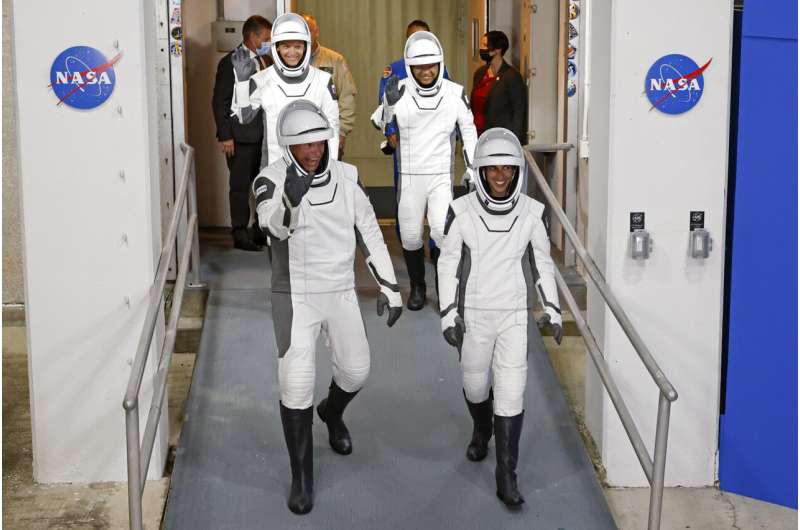
The astronauts’ paths to space couldn’t be more different.
Moghbeli’s parents fled Iran during the 1979 revolution. Born in Germany and raised on New York’s Long Island, she joined the Marines and flew attack helicopters in Afghanistan. The first-time space traveler hopes to show Iranian girls that they, too, can aim high. “Belief in yourself is something really powerful,” she said before the flight.
Mogensen worked on oil rigs off the West African coast after getting an engineering degree. He told people puzzled by his job choice that “in the future we would need drillers in space” like Bruce Willis’ character in the killer asteroid film “Armageddon.” He’s convinced the rig experience led to his selection as Denmark’s first astronaut.
Furukawa spent a decade as a surgeon before making Japan’s astronaut cut. Like Mogensen, he’s visited the station before.
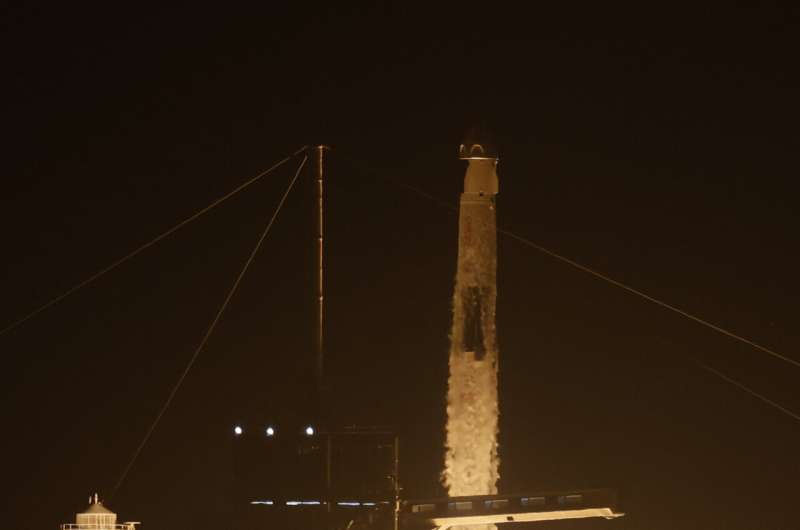
Borisov, a space rookie, turned to engineering after studying business. He runs a freediving school in Moscow and judges the sport, in which divers shun oxygen tanks and hold their breath underwater.
One of the perks of an international crew, they noted, is the food. Among the delicacies soaring: Persian herbed stew, Danish chocolate and Japanese mackerel.
SpaceX’s first-stage booster returned to Cape Canaveral several minutes after liftoff, an extra treat for the thousands of spectators gathered in the early-morning darkness.
Liftoff was delayed a day for additional data reviews of valves in the capsule’s life-support system. The countdown almost was halted again Saturday after a tiny fuel leak cropped up in the capsule’s thruster system. SpaceX engineers managed to verify the leak would pose no threat with barely two minutes remaining on the clock, said Benji Reed, the company’s senior director for human spaceflight.
-
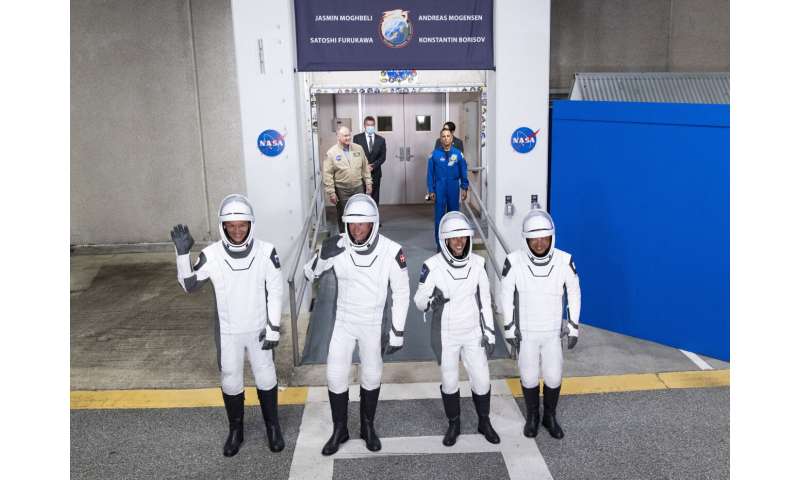
Russian cosmonaut Konstantin Borisov, Danish astronaut Andreas Mogensen, NASA astronaut Jasmin Moghbeli and Japanese astronaut Satoshi Furukawa, from left, prepare to leave the Operations and Checkout Building early Saturday, Aug. 26, 2023, before heading to the launch pad to board the SpaceX Falcon 9 rocket on a mission to the International Space Station, in Cape Canaveral, Fla. Credit: Joel Kowsky/NASA via AP
-
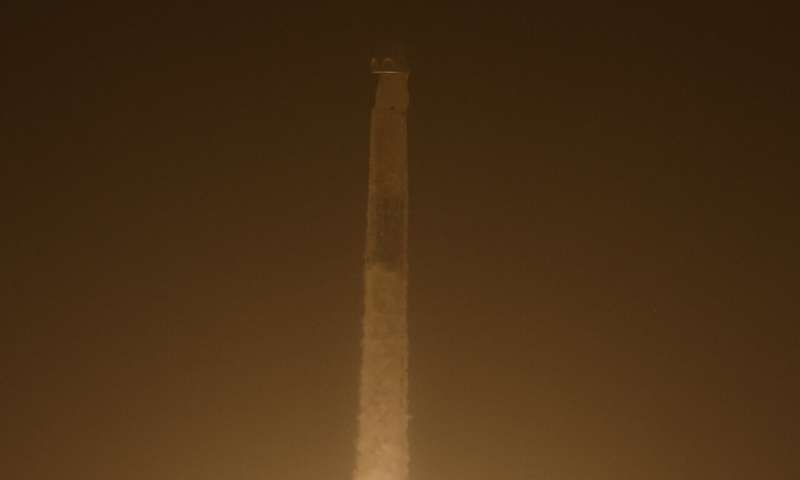
A SpaceX Falcon 9 rocket with the Crew Dragon spacecraft with astronauts on a mission to the International Space Station lifts off from pad 39A at Kennedy Space Center in Cape Canaveral, Fla., Saturday, Aug. 26, 2023. Credit: AP Photo/Terry Renna
-
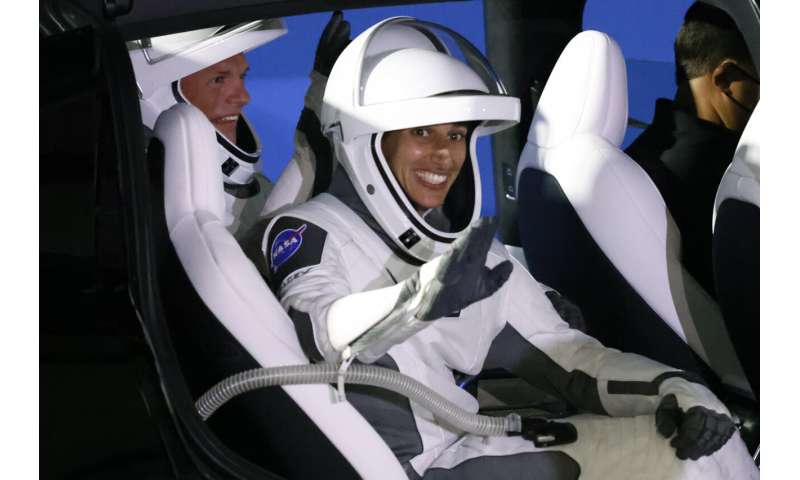
NASA astronaut Jasmin Moghbeli, right, and Danish astronaut Andreas Mogensen, left, leave the Operations and Checkout Building before heading to the launch pad to board the SpaceX Falcon 9 rocket on a mission to the International Space Station, at Kennedy Space Center in Cape Canaveral, Fla., early Saturday, Aug. 26, 2023. Credit: AP Photo/Terry Renna
-
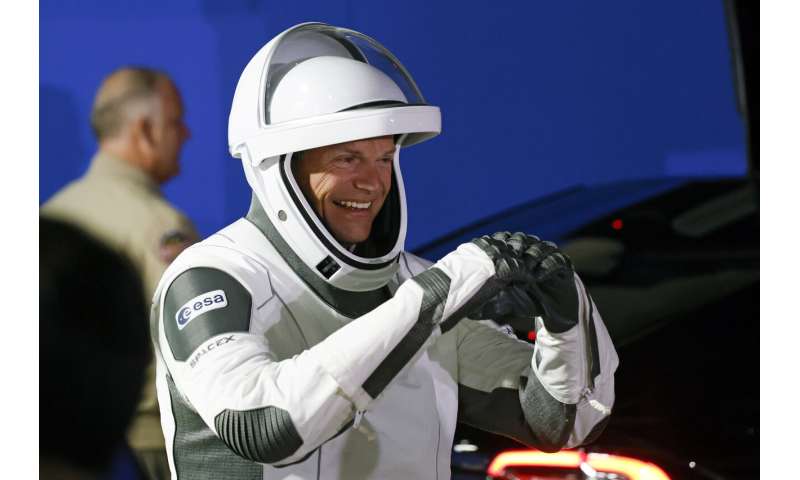
Danish astronaut Andreas Mogensen makes a heart shape with his hands as he leaves the Operations and Checkout Building before heading to the launch pad to board the SpaceX Falcon 9 rocket on a mission to the International Space Station, at Kennedy Space Center in Cape Canaveral, Fla., early Saturday, Aug. 26, 2023. Credit: AP Photo/Terry Renna
-
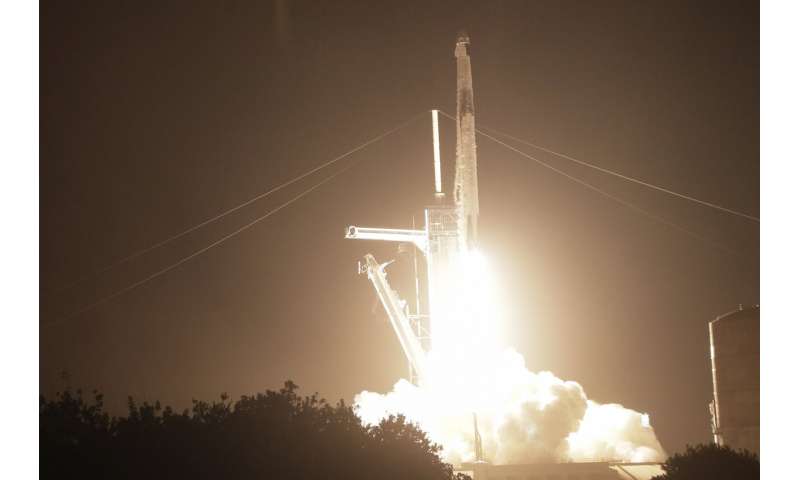
A SpaceX Falcon 9 rocket with the Crew Dragon spacecraft with astronauts on a mission to the International Space Station lifts off from pad 39A at Kennedy Space Center in Cape Canaveral, Fla., Saturday, Aug. 26, 2023. Credit: AP Photo/John Raoux
-
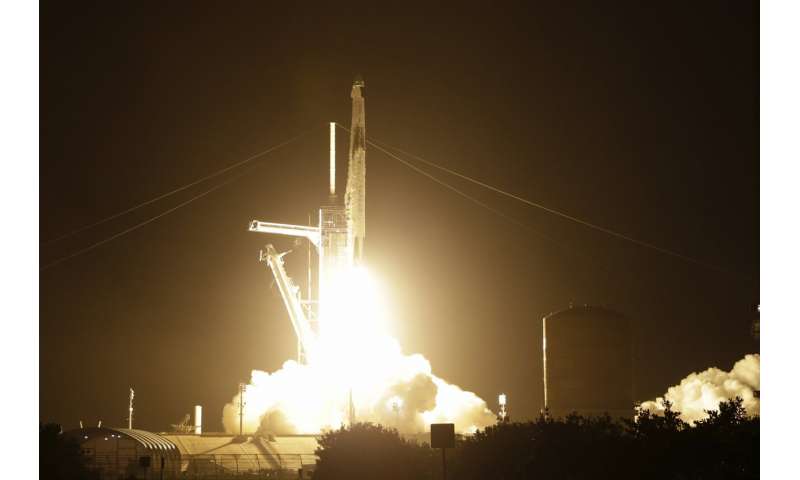
A SpaceX Falcon 9 rocket with the Crew Dragon spacecraft with astronauts on a mission to the International Space Station lifts off from pad 39A at Kennedy Space Center in Cape Canaveral, Fla., Saturday, Aug. 26, 2023. Credit: AP Photo/Terry Renna
-
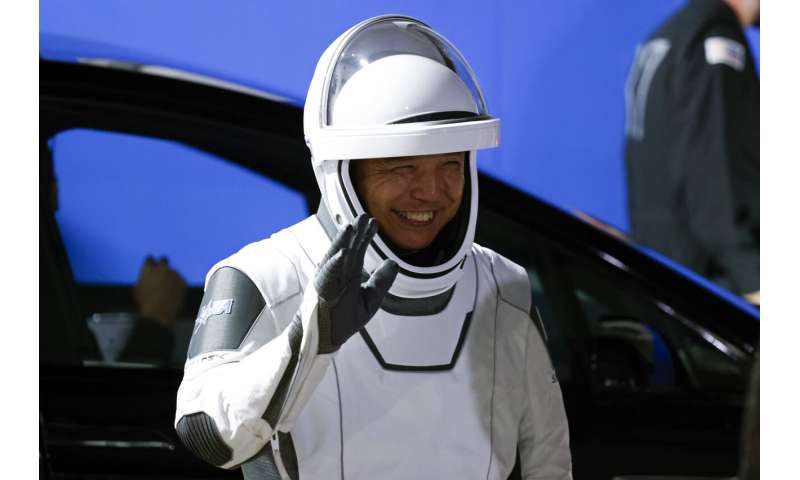
Japanese astronaut Satoshi Furukawa waves to family and friends as he leaves the Operations and Checkout Building before heading to the launch pad to board the SpaceX Falcon 9 rocket on a mission to the International Space Station at Kennedy Space Center in Cape Canaveral, Fla., early Saturday, Aug. 26, 2023. Credit: AP Photo/Terry Renna
-
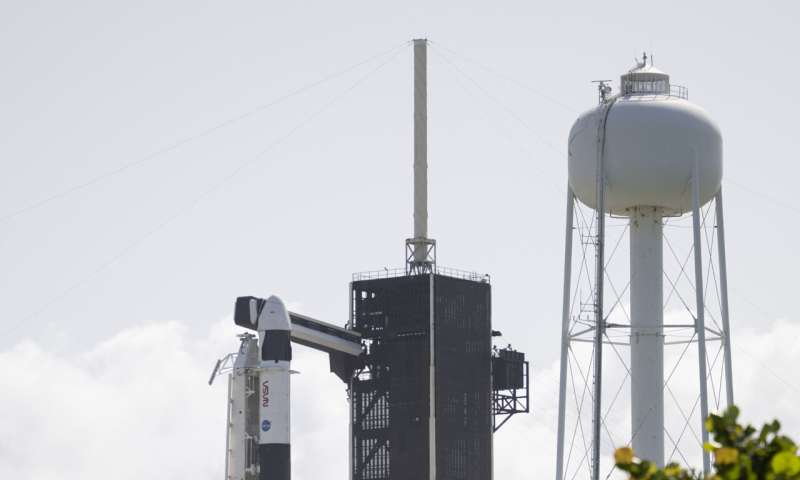
A SpaceX Falcon 9 rocket with the company’s Dragon spacecraft on top is seen on the launch pad at Launch Complex 39A as preparations continue for the Crew-7 mission, Monday, Aug. 21, 2023, at NASA’s Kennedy Space Center in Cape Canaveral, Fla. NASA’s SpaceX Crew-7 mission is the seventh crew rotation mission of the SpaceX Crew Dragon spacecraft and Falcon 9 rocket to the International Space Station as part of the agency’s Commercial Crew Program. Credit: Joel Kowsky/NASA via AP
-
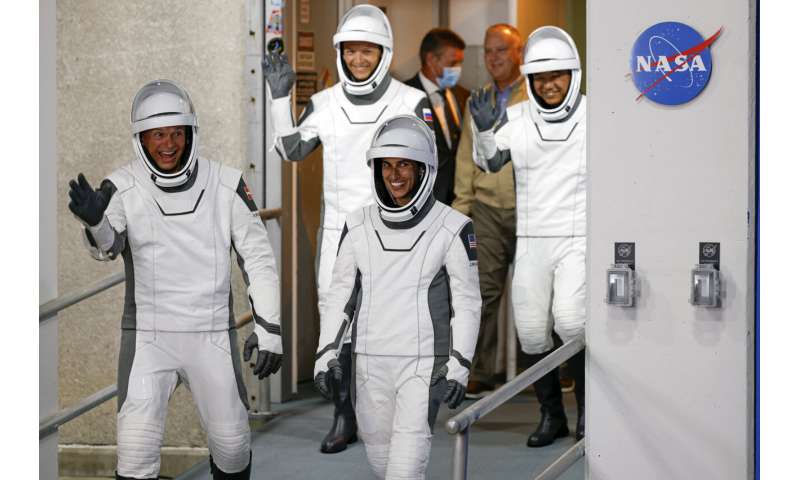
Danish astronaut Andreas Mogensen, left, front, NASA astronaut Jasmin Moghbeli, right front, Russian cosmonaut Konstantin Borisov, bck left, and Japanese astronaut Satoshi Furukawa leave the Operations and Checkout Building before heading to the launch pad to board the SpaceX Falcon 9 rocket on a mission to the International Space Station, at Kennedy Space Center in Cape Canaveral, Fla., Saturday, Aug. 26, 2023. Credit: AP Photo/Terry Renna
-
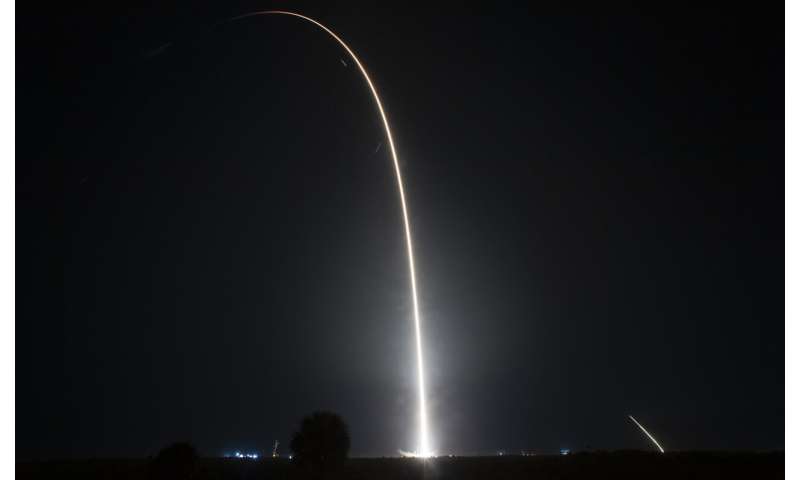
In this eight-minute long exposure, a SpaceX Falcon 9 rocket carrying the company’s Dragon spacecraft is launched on NASA’s SpaceX Crew-7 mission to the International Space Station with NASA astronaut Jasmin Moghbeli, ESA (European Space Agency) astronaut Andreas Mogensen, Japan Aerospace Exploration Agency (JAXA) astronaut Satoshi Furukawa, and Roscosmos cosmonaut Konstantin Borisov onboard, Saturday, Aug. 26, 2023, at NASA’s Kennedy Space Center in Florida. Credit: Joel Kowsky/MNASA via AP
-
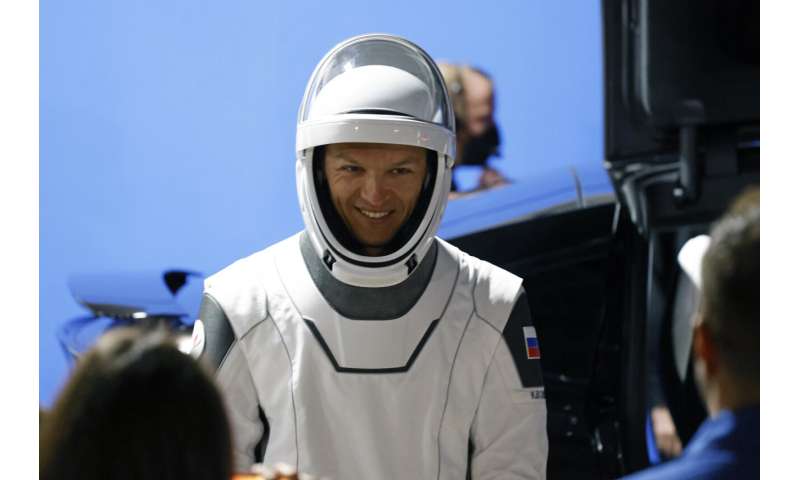
Russian cosmonaut Konstantin Borisov leaves the Operations and Checkout Building before heading to the launch pad to board the SpaceX Falcon 9 rocket on a mission to the International Space Station at Kennedy Space Center in Cape Canaveral, Fla., early Saturday, Aug. 26, 2023. Credit: AP Photo/Terry Renna
-
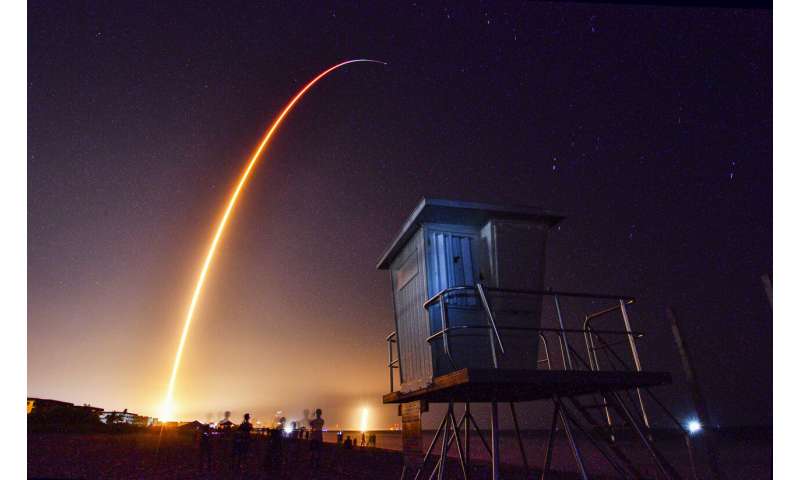
A SpaceX Falcon 9 rocket with the Crew Dragon spacecraft with astronauts on a mission to the International Space Station lifts off from pad 39A at Kennedy Space Center in Cape Canaveral, Fla., seen in Rockledge, Fla., Saturday, Aug. 26, 2023. Credit: Malcolm Denemark/Florida Today via AP
-
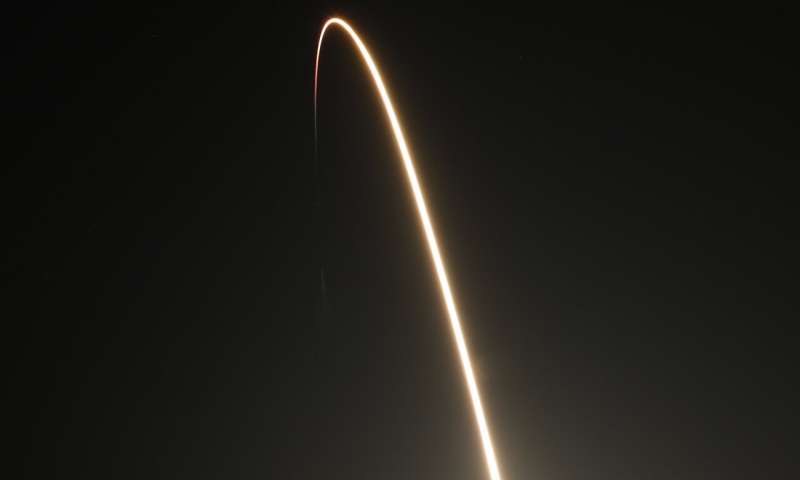
A SpaceX Falcon 9 rocket with the Crew Dragon spacecraft with astronauts on a mission to the International Space Station lifts off from pad 39A at Kennedy Space Center in Cape Canaveral, Fla., Saturday, Aug. 26, 2023. Credit: AP Photo/Terry Renna
-
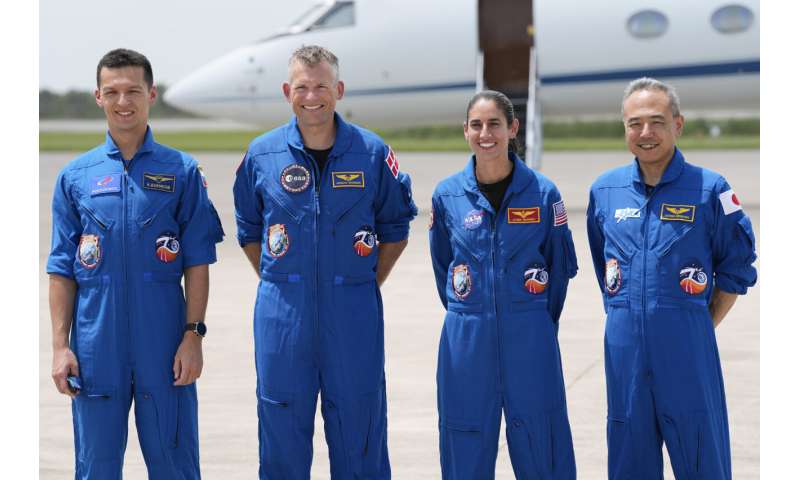
Astronauts, from left, Russian cosmonaut Konstantin Borisov, Danish astronaut Andreas Mogensen, NASA astronaut Jasmin Moghbeli and Japanese astronaut Satoshi Furukawa pose for a photo at a news conference at the Kennedy Space Center as they prepare for their mission to the International Space Station in Cape Canaveral, Fla., Sunday, Aug. 20, 2023. The launch to the space station is scheduled for early Friday, Aug 25. Credit: AP Photo/John Raoux
Another NASA astronaut will launch to the station from Kazakhstan in mid-September under a barter agreement, along with two Russians.
SpaceX has now launched eight crews for NASA. Boeing was hired at the same time nearly a decade ago, but has yet to fly astronauts. Its crew capsule is grounded until 2024 by parachute and other issues.
© 2023 The Associated Press. All rights reserved. This material may not be published, broadcast, rewritten or redistributed without permission.
Citation:
New crew for the space station launches with 4 astronauts from 4 countries (2023, August 27)
retrieved 27 August 2023
from https://phys.org/news/2023-08-crew-space-station-astronauts-countries.html
This document is subject to copyright. Apart from any fair dealing for the purpose of private study or research, no
part may be reproduced without the written permission. The content is provided for information purposes only.

